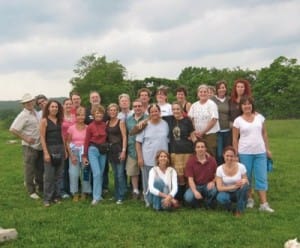Her colleagues call her a goofball; her clients nicknamed her “mama.” But Kate MacLeod-Michael calls herself a work in progress. Kate may be the youngest therapist at The Ranch, but she has been through a lot. She experienced trauma at a young age and was hospitalized for her own struggle with an eating disorder, followed by intensive outpatient work and ongoing therapy. “In some ways I think we all come to this field to heal ourselves,” she says. “I have embarked on my own healing process that continues to this day, and consider it a privilege to share it with others.” Putting Her Strengths to Good Use Kate discovered her passion for mental health treatment in college. Although she started as a history major, her interest in the human psyche led her to take enough psychology courses to pick up a minor. When a professor pulled her aside and suggested that this was a strength she should explore further, she listened. She applied to graduate school at Vanderbilt University, earned a master’s in Human Development Counseling, and went on to work in crisis counseling, social work and program planning, primarily helping teenage girls in state custody. All along, she questioned whether she was equipped for a career as a therapist. Then she was chosen as a primary therapist at The Ranch, where she has found the professional support and personal fulfillment that make even the most difficult days worth all the effort. “This is extremely difficult work and there are times when it feels like too much,” she says. “But I work with the best clinicians in the world who I learn from every day and can go to any time I need to talk, cry or bounce around ideas. I know I’ll always be treated with respect and compassion.” The Ultimate Reward As one of two primary therapists at Lake House – The Ranch’s 10-bed eating disorder and dual diagnosis facility – Kate leads individual and group sessions with women suffering from eating disorders as well as trauma, chemical dependency, relationship and love addiction, and other co-occurring issues. “Working in an inpatient setting, I get to see the fruits of my labor,” she says. “Clients at The Ranch are changing every day, which is the ultimate reward for a therapist.” Even in tough times, there are moments that remind Kate why she is so passionate about her work. At a recent talent show, the ladies of Lake House dressed up, got silly, and came together to deliver a sidesplitting rap about their recovery for the rest of The Ranch community. Kate beamed with pride because while the laughs provided welcome relief, the words were wise and insightful and reflected a deep understanding of core recovery principles. “It’s moments like those,” she says, “when it all comes together.” Empowering Women to Share Their Voice Having doubted her own abilities for years – for example, to recover from an eating disorder or become a therapist – Kate understands what it’s like to struggle with self-doubt. “As women, we’re mostly taught to sit quietly and look pretty,” she says. “But we’re not just bodies – we have views and abilities and a voice that is valid, and given the right tools we can become strong advocates for ourselves.” Kate’s personal philosophy on treatment melds with the approach at The Ranch, where therapy is invitational and client-centered. If the client needs to release anger or sadness, Kate may have them hit a foam block in her office, get loud with a primal scream, or write a letter to their perpetrator or disease. “For me, it’s about empowering the client to be her own agent of change rather than being the Super Therapist that fixes all of their problems for them or dictates what they have to do,” she says. Although she is nurturing by nature (hence the nickname “mama”), Kate doesn’t hesitate to confront her clients (with love and compassion) when necessary. “I try not to get bogged down in the distractions of the disease,” she explains. “Whether a client is struggling with an eating disorder, substance abuse or another problem, treatment is about peeling the layers of the onion and getting to the underlying issues. We want clients to realize that those behaviors are not who they are or what they’re about – they’ve been used by the disease as distractions to cover up who they really are.” Going Above and Beyond Addressing the underlying issues is a team effort at The Ranch. The staff meets at least twice a week and is in constant contact to ensure that clients receive the care they need to heal. “The staff truly cares about each and every client and goes above and beyond to make sure their needs are met,” Kate says. “Most of us are in recovery ourselves, which isn’t to say we have all the answers. But we understand the process and are willing to figure it out together, drawing on our own experiences and the clients’ expert knowledge of themselves.” Having been in therapy herself, Kate knows how terrifying it can be to think about getting help. She has also seen countless clients come back years later with their lives completely changed. “So many past clients tell me that The Ranch was the most important thing they ever did for themselves,” she says. “We are truly a family here – sisters in recovery, as we say – and anyone who is being held back by emotional issues deserves the healing they can get at a place like The Ranch.”
Call for Immediate Help:1.844.876.7680

